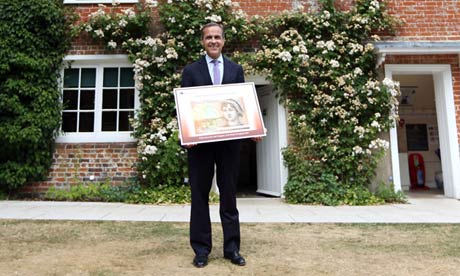
Jane Austen has been confirmed as the next face of the £10 note – but for the quote that will feature on the reverse, the Bank of England is steering clear of her many waspish observations on the subject of money in favour of a line from Pride and Prejudice: "I declare after all there is no enjoyment like reading!"
Using Austen's image on banknotes is surprisingly apt: her novels and letters feature an abundance of choice quotes and remarks on the obligations of wealth, the extravagance of the rich and the challenges presented by barely having enough money to live comfortably.
"I am sorry to tell you that I am getting very extravagant, and spending all my money, and, what is worse for you, I have been spending yours, too." That is not a line from a novel but from one of Austen's 1811 letters to her sister Cassandra, in which she discloses she went shopping for fabric but was "tempted" by a pretty-coloured muslin.
That's certainly not a sentiment that would have sat well with new Bank governor Mark Carney's predecessor, Sir Mervyn King, who was accused by some of banging the drum for the need for austerity.
If the Bank had been looking to preach a message of thrift, there are plenty of Austenisms to support that, too. In 1799, as a young woman, Austen was provided with an allowance of "£5 a quarter" by her father, according to the Jane Austen Society, and clearly wasn't above frequenting the 18th-century equivalent of the pound shop. "We have been to the cheap shop, and very cheap we found it," she wrote to Cassandra.
Or how about this line from an early work, Lady Susan: "When a man has once got his name in a banking-house he rolls in money." Perhaps a little too close to the bone, bearing in mind the recent kerfuffle surrounding the £874,000-a-year pay and perks package handed to Carney.
To his credit – or, perhaps, because he aware he was surrounded by Austenophiles who might fire the quote back at him – Carney proactively drew attention to the line when he delivered a speech at Jane Austen's House Museum in Chawton, Hampshire, on Wednesday to confirm that the author would appear on £10 notes, probably from 2017. King had previously let slip to MPs that Austen was "waiting in the wings" as a potential candidate to feature on a banknote.
"Jane Austen certainly merits a place in the select group of historical figures to appear on our banknotes. Her novels have an enduring and universal appeal and she is recognised as one of the greatest writers in English literature. As Austen joins Adam Smith, Boulton and Watt, and in future, Churchill, our notes will celebrate a diverse range of individuals who have contributed in a wide range of fields," said Carney.
The theme of money runs through Austen's novels, from Mr Darcy's reported £10,000-a-year fortune in Pride and Prejudice, to the Dashwood sisters' lack of cash in Sense and Sensibility.
"She does write about money, I think, more than any other canonical novelist in English," the Austen scholar Prof Janet Todd told an audience at the Hay festival last month. "All the Austen characters, except the entirely idealistic or the very stupid, know that the relationship to money is important."
Austen on money
• "A large income is the best recipe for happiness I ever heard of." – Mansfield Park
• "Oh! my sweetest Lizzy! how rich and how great you will be! What pin-money, what jewels, what carriages you will have! Jane's is nothing to it – nothing at all. I am so pleased – so happy. Such a charming man! – so handsome! so tall! … Ten thousand a year, and very likely more! 'Tis as good as a Lord!" – Mrs Bennet's remark to her daughter Elizabeth on hearing of her engagement to Mr Darcy, Pride and Prejudice
• "I am not without hopes of tempting Mrs Lloyd to settle in Bath; meat is only 8d per pound, butter 12d, and cheese 9 1/2 d. You must carefully conceal from her, however, the exorbitant price of fish: a salmon has been sold at 2s 9d per pound the whole fish." – from a letter written by Austen to her sister Cassandra in 1801
• "Business, you know, may bring money, but friendship hardly ever does." – Emma
• "We have been to the cheap shop, and very cheap we found it, but there are only flowers made there, no fruit; and as I could get four or five very pretty sprigs of the former for the same money which would procure only one Orleans plum – in short, could get more for three or four shillings than I could have means of bringing home – I cannot decide on the fruit till I hear from you again." – letter to Cassandra, 1799

